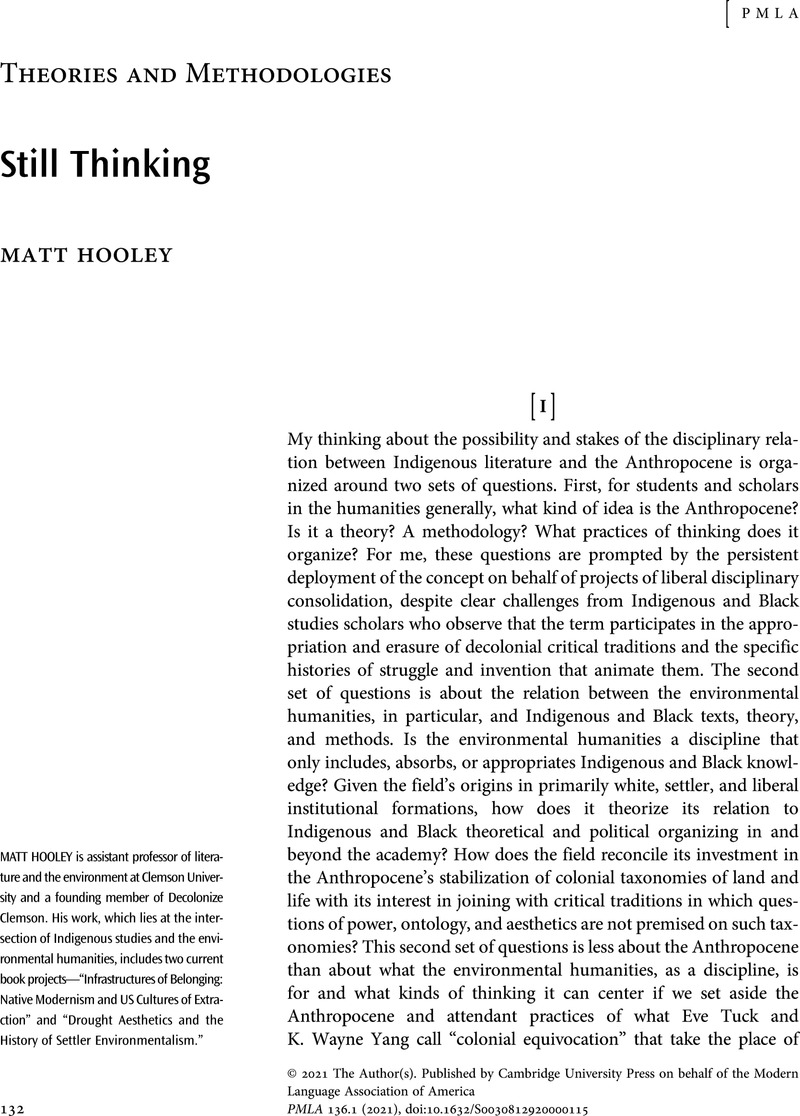No CrossRef data available.
Article contents
Abstract
An abstract is not available for this content so a preview has been provided. Please use the Get access link above for information on how to access this content.

- Type
- Theories and Methodologies
- Information
- Copyright
- Copyright © 2021 The Author(s). Published by Cambridge University Press on behalf of the Modern Language Association of America
References
Works Cited
Deloria, Vine Jr. “Relativity, Relatedness, and Reality.” Spirit and Reason: A Vine Deloria Reader, edited by Deloria, Barbara et al. , Fulcrum Publishing, 1999, pp. 32–39.Google Scholar
Eudell, Demetrius L. “The Landscapes of Man: Ecological and Cultural Change before Hurricane Katrina.” Cultural Dynamics of Climate Change and the Environment in Northern America, edited by Sommer, Bernd, Brill Press, 2015, pp. 188–214.Google Scholar
Goeman, Mishuana. “Ongoing Storms and Struggles: Gendered Violence and Resource Exploitation.” Critically Sovereign: Indigenous Gender, Sexuality, and Feminist Studies, Duke UP, 2017, pp. 99–126.CrossRefGoogle Scholar
King, Tiffany. The Black Shoals: Offshore Formations of Black and Native Studies. Duke UP, 2019.Google Scholar
Lewis, Simon, and Maslin, Mark Andrew. “Defining the Anthropocene.” Nature, vol. 519, no. 7,541, 2015, pp. 171–80.Google ScholarPubMed
Minch–de Leon, Mark. “Race and the Limitations of ‘the Human.’” After the Human: Culture, Theory, and Criticism in the Twenty-First Century, edited by Vint, Sherryl, Cambridge UP, 2020, pp. 206–19.Google Scholar
Tinker, George. “The Stones Shall Cry Out: Consciousness, Rocks and Indians.” Wicazo Sa Review, vol. 19, no. 2, Fall 2004, pp. 105–25.CrossRefGoogle Scholar
Todd, Zoe. “An Indigenous Feminist's Take on the Ontological Turn: ‘Ontology’ Is Just Another Word for Colonialism.” Journal of Historical Sociology, vol. 29, no. 1, Mar. 2016, pp. 4–23.CrossRefGoogle Scholar
Tuck, Eve, and Yang, K. Wayne. “Decolonization Is Not a Metaphor.” Decolonization, vol. 1, no. 1, 2012, pp. 1–40.Google Scholar
Whyte, Kyle Powys. “Our Ancestors’ Dystopia Now: Indigenous Conservation and the Anthropocene.” Routledge Companion to the Environmental Humanities, edited by Heise, Ursula K. et al. , Routledge, 2017, pp. 206–15.Google Scholar
Wynter, Sylvia. “Unsettling the Coloniality of Being/Power/Truth/Freedom: Toward the Human, after Man, Its Overrepresentation—An Argument.” CR: The New Centennial Review, vol. 3, no. 3, Fall 2003, pp. 257–337.CrossRefGoogle Scholar
Zalasiewicz, Jan, et al. “When Did the Anthropocene Begin? A Mid–Twentieth Century Boundary Level Is Stratigraphically Optimal.” Quaternary International, vol. 383, no. 5, Oct. 2015, pp. 196–03.CrossRefGoogle Scholar




